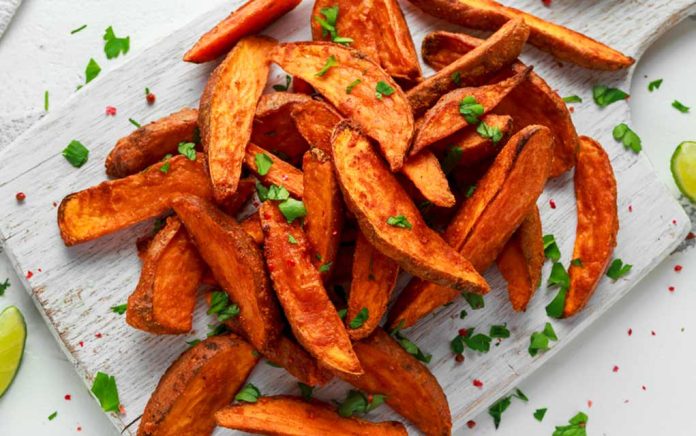
(HealthyResearch.com) – Sweet potatoes have become increasingly popular in the United States over the past 15 years. According to the Department of Agriculture, we saw a 42% consumption increase between 2000 and 2016, likely due to promotional campaigns highlighting their health benefits. Still, when it comes to starchy vegetables, white potatoes continue to reign supreme in sales and production.
There’s been some debate over which of the two is healthier, with some people claiming sweet potatoes are a better alternative. But are sweet potatoes really healthier than potatoes? Let’s take a closer look.
Sweet Potatoes Vs. Potatoes: Nutritional Value
Potatoes and sweet potatoes are only distantly related and don’t contain all the same nutrients, but they do share some common characteristics. Both are starchy root vegetables that, according to Healthline, contain nearly identical amounts of fat, carbs, calories and protein. Choose either for a good dose of vitamins B6 and C, as well as a small amount of magnesium.
Sweet potatoes don’t contain as much potassium as the white variety — only about 10% of the daily recommended intake compared to the 17% found in white potatoes. However, what they lack in potassium, they more than make up for in other areas. One serving of sweet potatoes provides a full dose of vitamin A for the day; white potatoes contain a mere 0.1%. Sweet potatoes are also slightly higher in calcium and a few other nutrients.
Sweet potatoes can differ by variety, each varying in fiber, starch and protein content. Purple sweet potatoes contain far more overall antioxidants than red, yellow and white varieties, for example, although all kinds of potatoes, even white Russets, may have their own cancer-fighting properties. On average, sweet potatoes also have a lower glycemic index than white potatoes, which means they have a lower impact on blood sugar and might be a healthier choice for diabetics.
Food Prep Makes a Difference
No matter which variety is on the dinner plate, how it’s prepared can make a world of difference in its nutritional content. Compare a serving of white or sweet potato fries to their baked counterparts. Frying adds significant calories and fat, and it reduces vitamin and mineral content in both, taking potassium levels down to nearly sweet potato levels in regular fries and reducing the vitamin A content in their denser counterparts.
Boiling reduces the starches and carbohydrates in both, making this cooking method ideal for diabetics and other people concerned with the glycemic index. Sweet potatoes take a little longer to boil, and they have a slightly different consistency when mashed. Instead of going with one or the other, try a 50/50 mix of the two to create an incredibly sweet, smooth-textured mashed potato that’s as nutritious as it is satisfying.
No matter how they’re prepared, all potatoes are a great addition to just about any healthy diet. The sweet types might be a little better in some areas, but the white ones have a lot to offer, too. Enjoy both for a good variety of vitamins and minerals and a huge amount of versatility in the kitchen.
~Here’s to Your Health & Safety!
Copyright 2021, HealthyResearch.com
















